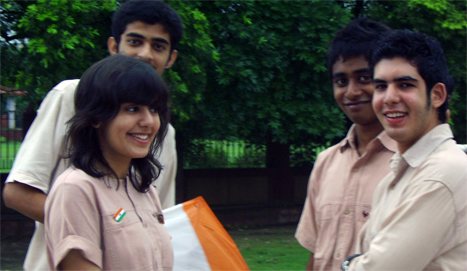India: Present Continuous
Having celebrated 61 years of her freedom just a few days back, India presides over the world’s largest democracy, embracing countless cultures, languages and religions. She basks in the praise of world leaders for her transformation from an impoverished British colony to a potential global super power.
India’s diverse economy encompasses agriculture, handicrafts, textiles, manufacturing, and a multitude of services which are much sought after by companies for the outsourcing of their customer services and technical support.
Although, India is now an economic force to reckon with, two- thirds of the population still earns its living directly or indirectly through agriculture, and the booming service sector employs a mere fraction of the workforce.
The picture is greatly complicated by vast socio-economic differences. The poor and wealthy live side by side in both urban and rural areas. The most poverty stricken states of Bihar, Orissa, Uttar Pradesh, Madhya Pradesh and Rajasthan, also have to contend with the largest and fastest growing populations. Even more disconcerting is the pitiful gender ratio of 927 girls for every 1000 boys under the age of 6, caused by the horrific prevalence of female infanticide coupled with the lack of education and awareness, and the failure to enforce legislation.
Discrimination prevails not just between genders but also between different religious communities. Throughout the nation religious differences are significant, especially among the Hindu majority and rather large Muslim minority.
But the one difference that crosscuts all differences of religion, region, gender, language and wealth, is caste. The people of India belong to hierarchically ordered groups ranging from the “untouchables” to the respected Brahmins. And it is this division, which often decides a person’s life.
Having gained independence not too long ago, India is still coming to terms with its new found freedom. There are multiple challenges that are still to be faced on our path to creating a “new and improved” India.
Boasting of the largest youth population on Earth and a thriving middle class, India surely has huge potential.
But changes will only begin the day when we, as Indians, truly believe that our goals are achievable; it is then that the inertia we seem to have been gripped by will no longer hold us back. And this conviction in ourselves will help us surge ahead on the road to development.
Let that day be TODAY.
Sanjana Malhotra

Performance by the Teachers |
LETTER TO THE EDITOR
Dear Editor,
St. Stephens. The word itself arouses in me an urge to upgrade my ambitions and sometimes even curse my own religion and caste. No, I am not an OBC embarrassed by the title, but neither am I a Christian. However, what importance does this inane, worthless fact hold in my life? Unfortunately, its importance is massive today. For if I am not a Christian student, it is possible, I might not be able to pursue my college education from one of the most prestigious educational institutions of India- St. Stephens.
I am not going to examine this controversial topic from the perspective of a dedicated Stephanian or alumni, but from the eyes of a future aspirant. In my view, reservation of seats up to 50 percent for Christians is blasphemous. Evidently, there is bound to be a rift between the authorities, namely the “Mafia” bishops and the Supreme Court, and the college members, since this bizarre step endangers the very secular credentials of the college.
Moreover, the demand for reservations for a particular sect or group never had a sensible justification since the admission process is not based on merit anyways. Providing reservations is like showering unnecessary privileges on a group of people, while diminishing chances of a more deserving candidate. Therefore, while we are expected to climb the rugged mountains of Everest, the Christians and to some extent the SC/ST’s can simply climb a few hills and be admitted to St. Stephens!
What binds Mani Shanker Iyer, Amitav Ghosh, Shashi Tharoor, Shekhar Kapoor and Pakistani dictator Zia-Ul-Alaq? They are all alumni of this reputed institution and are all from religions and castes pointing in varied directions. Yet, they have achieved immense success and recognition world over. So, why this decision to change the system instantly and create controversy?
Ironically, in the last forty years, the college has not been able to fill its Christian quota of forty percent. Therefore, it is evident that depriving general category students does not make sense. Most of the faculty members are also opposed to this arbitrary decision of the Supreme Court, without any involvement of the governing body of the college. To add to the college's agony, in order to preserve the college’s Christian character- the college is now looking at increasing the number of Christian teachers. This step too would hamper the quality of teaching in the college.
In a nutshell, the inevitable question arises, where does the essence of this agency lie? In the fact that for three memorable years, students make this place their holy abode, learning and growing as potential individuals or that the much coveted college’s reputation is gradually eroding because of the apparent sake of equality, while completely ignoring merit and letting religion overrule us completely.
Yours sincerely,
Karan Arya, XI B

The class 12 students enjoy their last Independence Day |